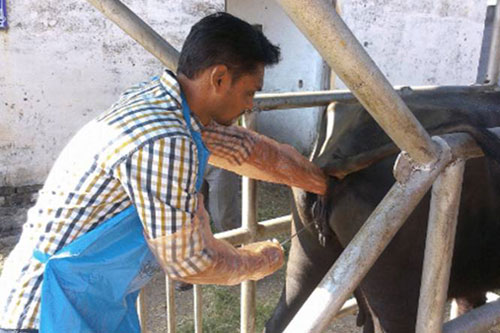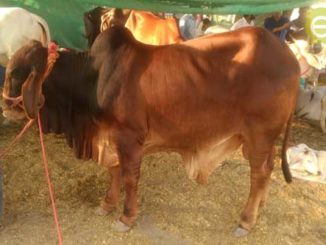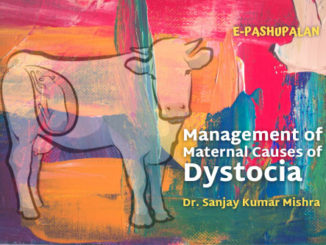Introduction
Good productions as well as good reproduction are two essential elements for making the dairy farming a profitable one. A number of new reproductive technologies have been implemented for enhancing reproductive performances of dairy animals. Artificial insemination (AI) is one of the most important reproductive technologies implemented by the dairy industry. AI is the tool that possesses the potential of economic and rapid diffusion of elite males to a large number of females in a short duration of time over a large geographical area.
Artificial insemination is a technique in which sperm are collected from the male, processed, stored and artificially introduced into the female reproductive tract at proper time for purpose of conception. AI is most common method of breeding intensively kept domestic livestock, such as dairy cattle, pigs and turkeys. According to Hafez (1980), artificial insemination is the most essential single technology ever discovered for animal genetic advancement. This is attainable because a small number of specially selected males generate enough spermatozoa to inseminate thousands of females each year. The success of AI technology lies on the efficiency of semen collection and preservation.
History
The first effective use of AI was described by Lazzaro Spallanzani (1780) in dog. He is also called “Father of modern artificial insemination”. In 1922, E.I. Ivanoff, a leading Russian investigator and a pioneer in artificial insemination, was the first man to undertake successfully the AI of cattle and sheep. In India, first time, AI was done by Sampat Kumaran (1939) at ‘Palace Dairy Farm Mysore”. The first buffalo calf through AI (1943) was born at the Allahabad Agricultural Institute.

Advantages of A.I.
AI is one of the most efficient tools accessible to dairy farmers to improve productivity and profitability of dairy enterprise. There are a lot of advantages of AI over natural services with bulls. They are as follows:
- Increased efficiency of bull usage
During natural breeding, a male will deposit much more semen than is theoretically needed to produce a pregnancy. In addition, natural breeding is physically stressful. Both of these factors limit the number of natural matings a male can make. However, collected semen can be diluted and extended to create hundreds of doses from a single ejaculate. Also, semen can be easily transported, allowing multiple females in different geographical locations to be inseminated simultaneously, and semen can be stored for long periods of time, meaning that males can produce offspring long after their natural reproductive live end. - Cost effectiveness
No necessity of maintenance of breeding bulls. Hence, the expenditure on maintenance of breeding bull is saved. - Increased potential for genetic selection
Because AI allows males to produce more offspring, fewer males are needed. Therefore, one can choose only the few best males for use as parents, increasing the selection intensity. Furthermore, because males can have more offspring, their offspring can be used in a progeny test program to more accurately evaluate the genetic value of the male. Finally, individual farmers can use AI to increase the genetic pool with which his or her animals can be mated, potentially decreasing effects of inbreeding. - Increased safety for animals and farmers
Because male animals are huge and aggressive, keeping a bull on a farm may be risky. Natural mating is also more likely to result in accidents and harm to the cow or the bull than AI since adult males are bigger than females. - Reduced disease transmission
Natural mating allows venereal diseases to spread between males and females. The use of AI minimises the risk of transmitting venereal illnesses such as granular vaginitis, trichomoniasis, navel ill, dourine, brucellosis, and coital exanthema by preventing sires from being exposed to infectious genital disorders. In other words, if only disease-free males are chosen for semen collection, AI can play a key role in preventing illnesses from spreading through sexual activity. - Improving animals’ productivity
AI plays an important role in enhancing animal productivity, especially milk yields, in developing countries that have a well-defined breeding strategy and a sound technical base to absorb and adapt the technology to meet their needs. Daughters of AI sires produce significantly more milk than those of herd bulls sires and the income from this extra milk may cover the extra costs resulting from extended calving intervals because of low heat detection. - Breeding can occur in the event of physical, physiological or behavioural abnormalities;
- AI is a powerful tool when linked to other reproductive biotechnologies such as sperm cryopreservation, sperm sexing.
- AI can be used in conservation of rare breeds or endangered species.
- The use of semen extenders containing antibiotics also helped to prevent the transmission of bacterial diseases.
Disadvantages of A.I.
- Cost of AI compared to natural service
Despite the well-known advantages of AI, a large number of dairy farmers all over the world still use natural service bulls to breed their cows. The main arguments allegedly justifying their choice are higher AI costs compared to those of keeping herd bulls and additional costs resulting from extended calving intervals because of low heat detection rates when AI is used. - Impact of AI in genetic diversity
Even though AI is highly effective in improving animals’ productivity, there is also a concern that its inappropriate or unplanned use can lead to increased rates of genetic erosion and breed extinction (Pilling et al., 2007). The heavy use of the best males results in a strong increase in inbreeding and a lose of genetic diversity. - Difficulty of heat detection
Because ova remain viable for about 12-18 hours after ovulation, precision of heat (estrus) detection is one of the most important elements that affects AI programme (Bekana, 1991). The inability to detect heat is the most prevalent and costly problem with AI program, and a key limiting factor in many dairies’ reproductive success. (Dalton, 2004). - Some males shed virus in semen without clinical signs of disease (“shedders”).
- Some bacterial pathogens are resistant to the antibiotics in semen extenders or can avoid their effects by forming bio-films.
- There has been a decline in fertility in dairy cattle and horses associated with an increase in AI.
- The focus on certain individuals may result in loss of genetic variation.
References
- Bekana M. Farm animal obstetrics, Monograph, Faculty of veterinary medicine, Addis Ababa University. 1991, 1-12.
- Dalton JC, Ahmadzadeh A, Shafii B, Price WJ, Dejarnette JM. Effect of simultaneous thawing of multiple 0.5 Ml straws of semen and sequence of insemination on conception rate in dairy cattle. J Dairy Sci. 2004; 87(4):972-975.
- Ivanoff EI. On the use of artificial insemination for zootechnical purposes in Russia. J Agr Set 1922;12:244–56.
- Pilling D, Cardellino R, Zjalic M, Rischkowsky B, Tempelman KA, Hoffmann I. The use of reproductive and molecular biotechnology in Animal Genetic Resources management: a global overview Animal Production and Health Division, FAO, V. ledelle Terme di Caracalla 1, 00100 Rome, Italy. 2007; 40:1-13.







Еverything iѕ very open with a very clear
deѕcription of the issues. Ӏt was definitely informative.
Youг site iѕ useful. Thank yߋu for sharing!